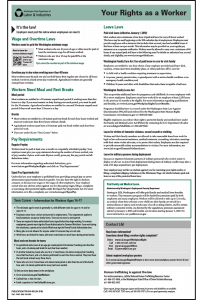 Lawmakers in Washington State have been active in recent years enacting groundbreaking new laws promoting workers’ family stability and economic security. Two significant examples are the 2017 Paid Family and Medical Leave (PFML) insurance program and the 2018 Equal Pay Opportunity Act (EPOA). The Department of Labor & Industries is informing employers and employees of these new laws with the 2019 update to the mandatory workplace posting, “Your Rights as a Worker.”
Lawmakers in Washington State have been active in recent years enacting groundbreaking new laws promoting workers’ family stability and economic security. Two significant examples are the 2017 Paid Family and Medical Leave (PFML) insurance program and the 2018 Equal Pay Opportunity Act (EPOA). The Department of Labor & Industries is informing employers and employees of these new laws with the 2019 update to the mandatory workplace posting, “Your Rights as a Worker.”
Equal Pay Opportunity Act
The EPOA requires employers to provide equal pay and career advancement opportunities to their employees, regardless of gender. The law prohibits gender from factoring in any way into compensation or benefit differentials between “similarly employed” employees. “Similarly employed” means work that is for the same employer, requires similar skill, effort and responsibility, and is performed under similar working conditions. The law does not prohibit pay differentials between similarly employed workers based in good faith on bona fide job-related factors that: (a) are consistent with business necessity, (2) are not based on or derived from a gender-based differential, and (3) account for the entire differential. Such factors include:
- Education, training or experience
- A seniority system
- A merit system
- A system measuring quality or quantity of production
- Regional pay differences
Like pay differentials, the EPOA also prohibits gender-based differentials in career advancement opportunities and requires any differentials in advancement opportunities to be based on bona fide job-related factors.
The EPOA places several other limitations on employers. The law is clear that an employer cannot use employee’s salary history to justify a wage differential. Employers cannot prohibit employees from inquiring about, disclosing, comparing and discussing their own wages or the wages of any other employee. Effective July 28, 2019, the EPOA also prohibits employers from seeking the wage or salary history of job applicants prior to the offer of employment that includes compensation.
Paid Family and Medical Leave Law
This act created a statewide insurance program that provides Washington employees with up to 12 weeks (up to 18 weeks in special circumstances) of paid leave:
- To bond with a newborn or a child placed for adoption or foster care
- For their own serious illness or injury
- To care for a family member with a serious illness
- For certain military-connected reasons
Nearly all Washington employers, including out-of-state employers with Washington employees, are required to participate in the program. The program is funded by premiums paid by both employers and employees. Premium collection began on January 1, 2019. The premium rate for 2019 is 0.4% of a worker’s gross wages, about 63% of which is paid by the worker and about 37% is paid by the employer. Participants can use the state’s Premium Calculator to estimate their share of the premium collection based on the employee’s pay. Employers with fewer than 50 employees are not required to pay the employer portion of premiums. Employers can opt out of the insurance program and implement a state-approved voluntary plan providing equivalent benefits.
Employees are eligible for paid family or medical leave after working 820 hours during a qualifying period, usually the first four of the last five completed calendar quarters. Eligible employees can begin exercising benefits on January 1, 2020. The amount of an employee’s benefit will depend on how much the employee earns. In 2020, the maximum weekly benefit is capped at $1,000. Each year, the cap will be adjusted based on state wage reports. An employee will be able to choose whether to supplement PFML benefits with any employer-provided paid vacation, sick, or other paid time off benefits they have accrued.
Although an employer may not interfere with, restrain, or deny the exercise of leave rights, the PFML does not provide job protection to all employees. An employee must be restored to their previous position if they work for an employer with 50 or more employees, have worked for the employer for at least 12 months, and have worked 1,250 hours prior to taking PFML.
Summary
Washington’s mandatory workplace posting, “Your Rights as a Worker” has been updated to provide employees with notice of their rights with respect to the EPOA and the PFML. Other significant changes to the 2019 “Your Rights as a Worker” posting are that employers must provide:
- agricultural employees with a second 30-minute meal period after working 11 hours
- reasonable accommodations to victims of domestic violence, sexual assault and stalking
Employers that already have a Washington State All-On-One™ Labor Law Poster can easily update the poster with the “Your Rights as a Worker” Peel ‘N Post™ sticker. Of course, employers have the option of purchasing a new Washington State All-On-One™ Labor Law Poster for their workplaces.
|
|
